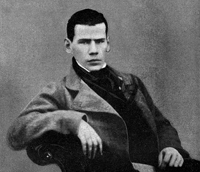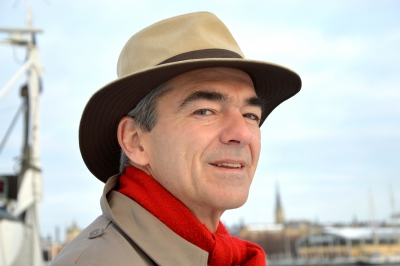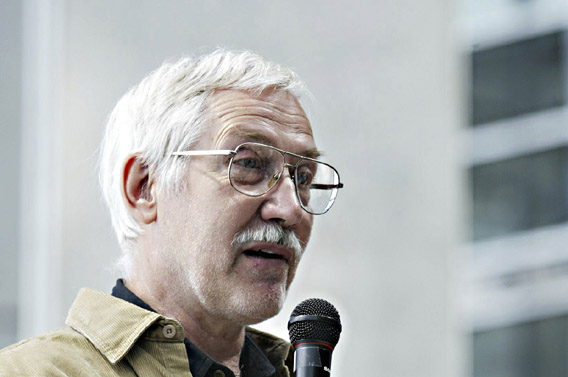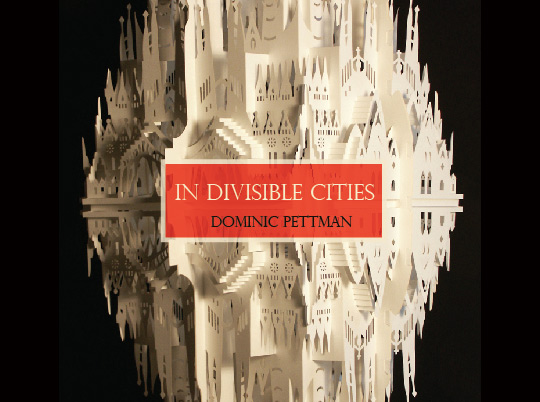I did not like 2013 and I’m not sorry to see it go. It’s taking with it some dear loves and some beloved stars, and so I’ll live with it my whole life. When tomorrow comes, this will be a year ago.
Monthly Archives: December 2013
A couple of weeks ago I was looking for a book at home and my eyes kept being drawn to big books: 2666, The Emperor of Lies, Ulysses, The Satanic Verses, Stone Upon Stone. Thick books with titles and author names in large font—and I noticed all by men. And what about women? I’d studied literature, helped judge the Best Translated Book Award a couple times, and I review books, so I assumed I had lots of big books, a good balance of literary work by everyone from everywhere. In a few minutes’ time though I counted eighteen big, 500-plus-page books by men and just one by a woman: Simone De Beauvoir’s The Second Sex.
We give you the ten most popular articles published this year at Asymptote:
I’ve been working on an art exhibition called LOST HORIZON this year which has meant re-visiting the James Hilton classic from 1932 — ‘The first paperback ever published’ —or so the blurbs say. This is where the term ‘Shangri-La’ comes from. The movie, by Frank Capra is wonderful, too.
From all of us at Asymptote, we’d like to wish you a happy holiday season, and to thank you for reading us this year. We look forward to 2014 where we will continue to publish new literature from around the world. Today, as promised, please enjoy a short excerpt from Jan Henrik Swahn’s novella Manolis’ Mopeds, translated from the original Swedish by the author himself.
Jan Henrik Swahn was born in 1959 in Lund. He grew up in Copenhagen and from 1970 on has lived in Malmö. His first novel, I Can Stop a Sea, about life in two gangster’s houses in a poor village in Normandie, was published in 1986 by Bonniers, the biggest publishing house in Sweden. The ten novels that followed were all published by Bonniers, and he was chief editor of Bonniers Literary Magazine from 1997-1999.
Although I look forward to reading the “Best of the Year” posts from my fellow readers, I hesitated to write one myself. My reading rarely aligns with the year’s releases, and if I could I’d positively enjoin everyone from reading primarily contemporary writing. The past, too, is a foreign country, and, in the transnational spirit of Asymptote, it’s another country that we ought to make a habit of visiting.
READ MORE…
Weekly News Roundup, 20th December 2013: Copyright struggles, BTBA speculation, Kafka-esque video games

A look at some of the most important literary news of the past week
2013 isn’t over yet, which means ‘tis (still) the season for awards and year-end lists. Of course, at Asymptote we’re partial to translated literature (you could say we’re number three on this list), which means we’re especially excited about Three Percent’s upcoming Best Translated Book Award. Over at Three Percent, our very own editor-at-large Daniel Medin reflects on his personal favorites for this year’s award—and some Asymptote appearances, like Mircea Cărtărescu’s Blinding, are in the mix. The head of the Complete Review Michael Orthofer first reflects on this year’s translated Dutch fiction in the running, then on the Best Translated Book Award’s treatment of that ever-snubbed category, genre fiction.
It’s not just our editors who are hard at work, writing, translating, and publishing. Our terrific contributors are also involved in a myriad of worthwhile projects in different countries and languages – precisely why we’d like to introduce our very first monthly roundup of news from past contributors.
This year’s Croatian Theatre Showcase, held from November 28 to December 1 in Zagreb, was the first such revue since Croatia joined the European Union last July. The plays represented in the showcase were not simply the most popular or highest-grossing shows of the year; they all shared a certain attitude, a social awareness, a desire to, as the organizers stated, “speak out about the time and place in which they were created.“ Fine Dead Girls (directed by Dalibor Matanić) deals with the issue of our society’s attitude towards homosexuality, Hermaphrodites of the Soul (choreographed by Žak Valenta) and A Barren Woman (directed by Magdalena Lupi Alvir), each in its own way, tackle the problem of gender roles, while Yellow Line (directed by Ivica Buljan) speaks out about our uncertainties and misgivings about the European community we recently joined. Coupled with the fact that all of the shows were translated and subtitled in English, it could be said that the aim of the Showcase was to represent not only Croatian theatre, but the current state of Croatian society in general, to foreign viewers. Intrigued by this concept, I sat down with theatrologist and dramaturge Matko Botić, one of the organizers of this event, to chat about the Showcase, the idea behind it, the issues arising from translating theatrical texts, and the state of Croatian theatre in general.
Jaan Kaplinski was born to an Estonian mother and Polish father in 1941 in Tartu, Estonia. His father was arrested by the NKVD for ‘possible subversive anti-Soviet activity’ and disappeared in the Gulag archipelago during the war, probably dying in 1943. Says Kaplinski: “He saw me, but I have no memory of having seen him.”
Ladies and gents, let us introduce Asymptote Blog’s newest regular feature: a Proust (or should we say Lydia Davis?) questionnaire for translators! First up, French translator extraordinaire Edward Gauvin, whose newest translation, The Conductor and Other Tales by Jean Ferry– French Pataphysician, Surrealist, fantasist, and “borderline” Oulipian–is just out from Wakefield Press.
Who is your favorite fictional character of all time?
Borges.
Weekly News Roundup, 13th December 2013: Nobel legacies, Drudging book judging, Languages on the Internet

A look at some of the most important literary news of the past week
Nelson Mandela’s passing highlighted his indelible legacy across the globe, and his inheritance is remarkably literary. At n+1: on what Mandela and Tolstoy have in common (which is more than you might think!), while the Los Angeles Times reflects on Mandela’s undeniable effect on the theater inside and outside of South Africa. In case you’re interested, Mandela’s inauguration speech has resurfaced, and it’s worth a checking out—as is his only feature-film appearance. At Asymptote, we’re inclined to remember Mandela the best way we know: through his books. READ MORE…












